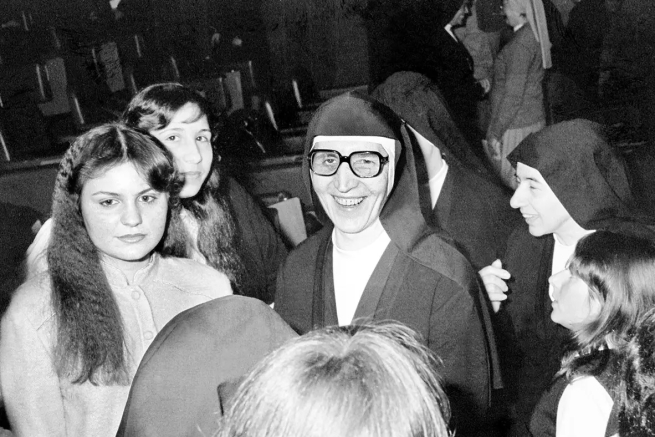All those who knew the Servant of God Mother Rosetta Marchese were convinced that they were in front of a woman of the Holy Spirit who knew how to deeply intuit consciences and hearts, a woman immersed in God, whose Presence she perceived and communicated, a living sign of the love of Jesus the Good Shepherd and of the tenderness of Mary Help of Christians. Her inner beauty struck and generated in the people who met her the desire for evangelical authenticity; her testimony motivated a renewal in the commitment to holiness, radicalism, and joy.
The charm of her person came from having placed her gaze only on Jesus, from her being lost in Jesus in the Trinity with the title of bride. On a page of her notebook she wrote, “Our intimacy with God is fruitfulness, it is the fruitfulness of the Congregation that needs souls who are brides of the Holy Spirit.”
In a letter to Sr. Luciana D’Auria, before the spiritual exercises in the Community of L’Aquila in preparation for her new mission as Provincial of the Roman Province, she shared her spiritual approach to the new obedience that challenged her and asked her for a further step in the life of the spirit and in the gift of self. “Actually, I feel a very beautiful turning point… I look at these Animators, I think they are now ‘mine’. I see behind them all the sisters, all the souls that gravitate around the houses of the Province, and I feel a great desire to cry, but it is a sweet cry, full of annihilation and gratitude towards the Good God. He wants to expand spaces of charity in my poor heart. He wants to give my life a capacity for greater service, for more complete self-giving, for total forgetfulness of myself. Isn’t this all very beautiful?”
Precisely because she was the spouse of Jesus, Mother Rosetta felt she was a fruitful, generative mother and an accompanying presence. Her educational passion, lived in her motherhood, was supported by a profound inner life. In her notebook, she leaves a trace of this spiritual experience. With the eyes of faith, she saw Jesus placing in her womb the sisters, young people, lay people of the educating communities with whom she came in contact to make them grow in the Christian life, in their vocational response, and nourish them to divine life.
Her ‘presence’ was marked by making herself a welcoming womb like Mary, to generate the people entrusted to her to the life of Grace. It is no coincidence that the style of animation, governance, and accompaniment for Mother Rosetta was imbued with motherhood and had as a propulsive force her being entirely consigned to the Lord, to the Holy Spirit.
Thus, in her life, Mother Rosetta experienced “the generative power of the charism” which must continue to bring full life even in the unprecedented daily life of each FMA, as the Acts of the XXIV General Chapter indicate.
On the day in which her birth into heaven is remembered, that took place on 8 March 1984, in this 150th anniversary of the foundation of the Institute, the Daughters of Mary Help of Christians are called upon as educators, to become ever more profoundly generative women, according to the experience of the Founders and of Mother Rosetta Marchese, who knew how to become a mother who is present, a “friend of the soul” of many young people. With love and freedom, she accompanied them and helped them to mature in the adult life of faith, as a mother does with her children, with the wisdom of small steps.
Source: CGFMAnet.org


